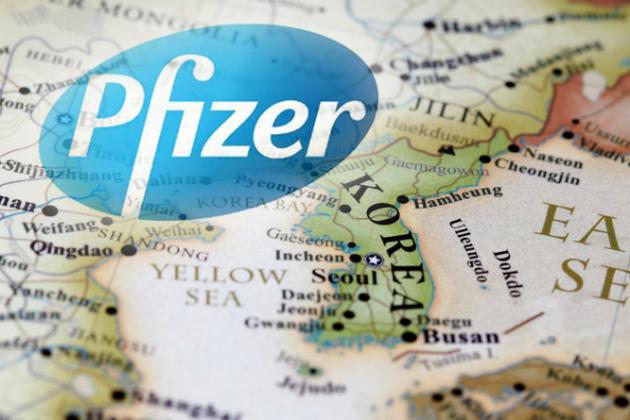Pfizer Korea’s sales power is dwindling in the local generic drug market, as its declining revenue has prompted generic drug makers to cancel their drug approvals voluntarily.
LG Chem recently withdrew the drug approval for Olme V tab 20mg, a treatment for high blood pressure. Starting its generic drug business, Pfizer Korea selected LG Chem as a partner firm to manufacture generic drugs.

LG Chem’s withdrawal apparently resulted from Pfizer’s sluggish sales of Olme V tab 20mg. The generic drug failed to post 10 million won ($9,200) in accumulated sales by the third quarter this year, according to data from U-BIST, a pharmaceutical market researcher.
Most of the generic drugs, manufactured by LG Chem and sold by Pfizer Korea, such as Cilo V, Montelu V, Clo V, Gapraton, Losar V, and Irbe V, are showing weak sales. Except for Lorvasc V, no generic drug has sold more than 1 billion won in accumulated sales by in the first three quarters of this year.
Observers said Pfizer Korea might face further voluntary canceling of other generics. LG Life Sciences, now merged with LG Chem, in July withdrew drug approvals for Valsa V, Cande V, Cande Plus V, Telmi Plus V, and Loxo V, all of which suffered sluggish sales.
Not only Pfizer but Sandoz, a generic drug unit under Novartis, and the world’s largest generic manufacturer Teva are also underperforming in the local market.
Sandoz has only three generic drugs that have exceeded 1 billion won in accumulated sales by the third quarter this year in the local market, according to U-BIST data. Except for anti-inflammatory drug Naramig, blood pressure reducer Imprida, and Parkinson’s Disease therapy Sinemet, generics made by Sandoz have failed to show meaningful earnings. One silver lining is that the company’s operating loss narrowed to 1.8 billion won last year from 3.7 billion won in 2012.
Teva has suffered operating loss for several years in the local market. Established in 2013 as a joint venture between Teva and formerly Handok Pharmaceuticals, Teva-Handok drew attention as a business expansion of the generic behemoth.
However, the company posted 10.6 billion won operating loss in 2015, and 5.7 billion won operating loss last year. Its generic drug sales are larger than those of Pfizer Korea and Sandoz, with many generic drugs selling more than 1 billion won in prescription sales.
By the third quarter, accumulated outpatient prescription sales of Fentora stood at 5.93 billion won, and that of Tamoplex at 1.65 billion won. Zygard sold 1.29 billion won in accumulated outpatient prescription sales by the third quarter this year, and Megaforge, 1.9 billion won.
The underperformance of multinational pharmaceutical firms in the local generic drug market is attributed to their incompetence in price, efficacy, and corporate brand, sources said.
Pfizer’s failure to adapt to local sales environment at clinics is cited as one of the reasons for generics sales decline. Pfizer sells generic drugs made by LG Chem only. While Pfizer has been focusing its sales on large tertiary hospitals, it has partnered with local drugmakers such as Handok and Ahn-Gook Pharmaceutical to take care of sales at smaller-sized clinics.
However, clinics prescribe generic drugs as much as large hospitals. Pfizer’s direct sales of generics at clinics incurred weak sales, some sources said.
“Multinational pharmaceutical firms might have an advantage in sales at general hospitals, but it is a different story at the clinic level,” said a salesperson at a local drugmaker. “The generic drug sales at clinics hinges on sales competitiveness. There is no reason local drugmakers should be left behind global players in this area.”

